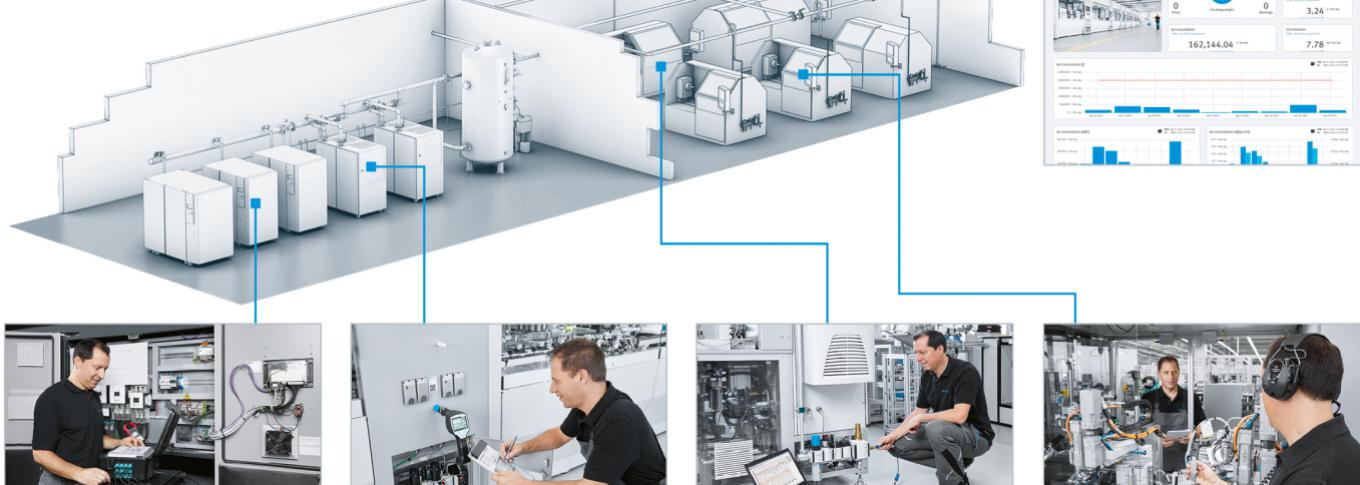
How many users of compressed air know where the weak points in their systems are?
Operating costs for pneumatic equipment can be reduced by up to 60% if system operators put into practice the results and analyses of the Compressed Air Energy Efficiency Audit GFAA by Festo. Energy efficiency experts from Festo use an integrated approach to analyse the entire compressed air system, from the compressor to the application, and recommend measures to reduce energy consumption. Climate protection is also included in the service, since the cost and energy savings naturally result in lower CO2 emissions and higher productivity.
In a study conducted by the Fraunhofer Institute for Systems and Innovation Research ISI, “Compressed Air Systems in the European Union”, the main cost drivers in compressed air systems were analysed. This found that the energy costs of compressed air generation account for the lion’s share of the overall costs at 77% – significantly more than the investment costs of 14% and the maintenance costs of 9%. It therefore seems obvious to take a closer look at these cost drivers. “The Compressed Air Energy Efficiency Audit GFAA by Festo is the right analysis tool for this,” explains Sven Lensdorf, Head of Sales Operations Services at Festo. “With the results, operators can generate compressed air more efficiently, reduce compressed air consumption and avoid pressure losses.”
Five-part audit
The audit consists of five steps. In the first three steps, the energy efficiency experts from Festo analyse the compressed air generation, compressed air preparation and compressed air distribution of the entire system. By implementing the results of the analysis, the service life of the pneumatic components can be increased and machine and production downtimes are reduced.
The fourth step of the audit focuses on the pneumatic applications in the machines and systems themselves. The auditors analyse the energy efficiency of these machines and systems and detect any leaks. They check whether drives, valves and tubing are optimally sized, whether blowing and vacuum applications are efficiently designed and whether installation and control concepts should be optimised.
In the fifth and final step, the specialists design a concept for a compressed air monitoring system to permanently monitor the energy states, and that can be supported by artificial intelligence at the customer’s request.
Realising and tracking savings potential
All measurement results and analysis data collected during the audit are documented on the online Energy Saving Services Portal. This online portal with mobile app makes all data globally available and accessible in real time, with user-defined access privileges. The recommended actions for optimising the compressed air energy efficiency and their savings potential are ranked in order of priority and made available on the portal; the spare parts needed to implement the optimisation measures can also be found on the portal and can be ordered directly online with one click.
If requested by the customer, the specialists from Festo can replace faulty parts such as tubing, fittings, cylinders and valves and thus create the basis for compressed air savings of up to 60%. All optimisations carried out and leaks fixed are documented on the online portal and tracked.
The final report from the compressed air energy efficiency audit can be used for energy management in accordance with ISO 50001. The documentation also includes the CO2 emission values of the compressed air system, which machine and system operators can use for their sustainability report, for example in accordance with GRI or GHG.
Festo is a global player and an independent family-owned company with headquarters in Esslingen am Neckar, Germany. Festo has set standards in industrial automation technology and technical education ever since its establishment, thereby making a contribution to sustainable development of the environment, the economy and society. The company supplies pneumatic and electrical automation technology to 300,000 customers of factory and process automation in over 35 industries. Digitalization, AI and the LifeTech sector with medical technology and laboratory automation are becoming increasingly important. The products and services are available in 176 countries. With about 20,600 employees in over 250 branch offices in around 60 countries worldwide, Festo achieved a turnover of around €3.45 billion in 2024. More than 8% of this turnover is invested in research and development. In this learning company, 1.5 % of turnover is invested in basic and further training. Festo Didactic SE is a leading provider of technical education and training and offers its customers worldwide comprehensive digital and physical learning solutions in the industrial environment.



